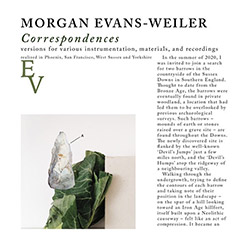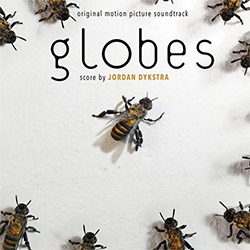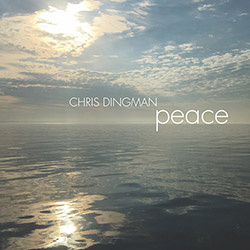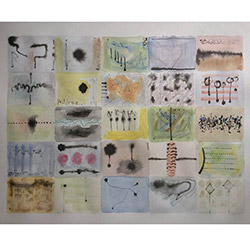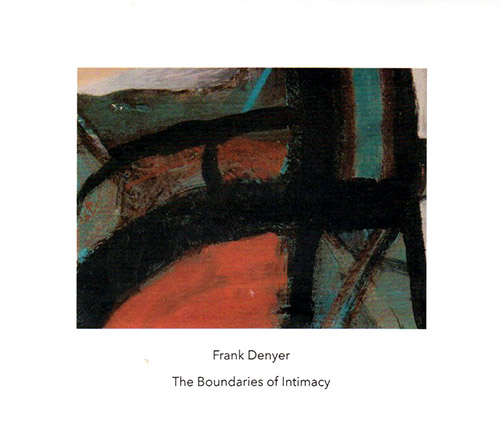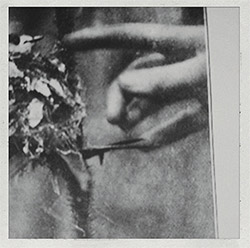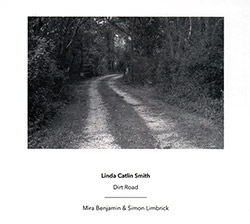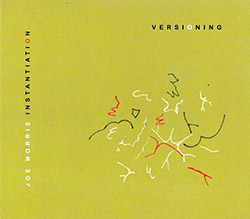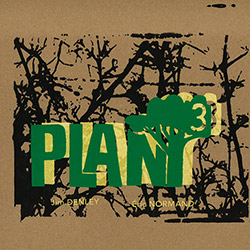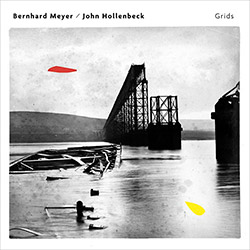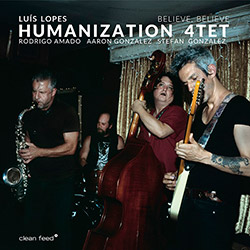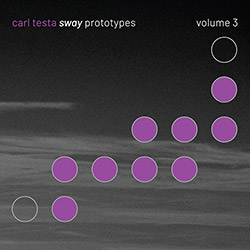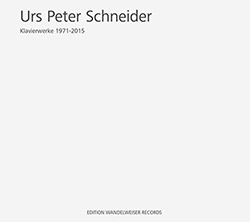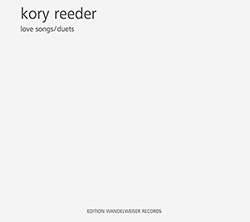![Falzone, J.P.A. / Morgan Evans-Weiler: Chordioid [2 CDs] (Another Timbre) Falzone, J.P.A. / Morgan Evans-Weiler: Chordioid [2 CDs] (Another Timbre)](https://www.teuthida.com/productImages/misc4/28757.jpg)
2 CDs of works for violin, piano & vibraphone, composed and performed by two young American composers and members of the ensemble Ordinary Affects, who have recorded music by the Jurg Frey, Magnus Granberg, Michael Pisaro, Eva Maria Houben, &c.; the 1st disc presents the Feldman-esque work of JPA Falzone, while the 2nd contains an exquisite new work by Morgan Evans-Weiler.
In Stock
Quantity in Basket: None
Log In to use our Wish List
Shipping Weight: 3.00 units
Sample The Album:
Morgan Evans-Weiler-violin
J.P.A. Falzone-piano, fortepiano, vibraphone
Click an artist name above to see in-stock items for that artist.
Label: Another Timbre
Catalog ID: at152x2
Squidco Product Code: 28757
Format: 2 CDs
Condition: New
Released: 2020
Country: UK
Packaging: Cardboard Gatefold 3 Panels
Recorded at Wesleyan University, in Middletown, Connecticut, in January, 2019, by Luke Damrosch.
Another Timbre Interview with J.P.A.Falzone
How did the duo project with Morgan Evans-Weiler come about?
Morgan and I have been performing together in Ordinary Affects since the group's inception in 2016. Playing a great deal of music that is generally minimal in texture, it dawned on me that taking up the unusual doubling of vibraphone and piano would enable me to enrich the sound without necessarily giving the impression of an overall greater density. It is especially practicably suitable for music where both instruments are 'pedal down' -- senza sordina, so to speak. Morgan liked this technique and suggested we write pieces for each other in this arrangement -- sort of trios for duo, to paraphrase Mary Jane Leach. It was initially planned that each piece would be about an hour. The opportunity to include fortepiano arose when we decided to record at Wesleyan University, where I was studying at the time.
The doubling of vibraphone and piano is a really interesting feature of the recordings. It reminds me of some of Feldman's long late pieces, where piano and celesta are doubled.
Those pieces are great inspirations to me - particularly For Philip Guston and For Christian Wolff. In the same breath I would mention Crippled Symmetry and Why Patterns? The vibraphone at least presents the interesting possibility of being bowed, serving as a sustaining or line instrument, versus the celesta. But of course, Feldman would not have asked the pianist to play the vibraphone as well - and, interestingly, to my knowledge, he never made use of bowed vibraphone. So, a principle of economy entered my thinking - could the pitched-percussion/piano be collapsed to one player? Morgan's ability to play in an austere style, senza vibrato, ultimately contributes a great deal to the overall effect of the pieces on these recordings.
Feldman's approach to writing asymmetrical patterns has long fascinated me. He openly embraced intuitive strategies of course, in defiance of formalised systems. His work represents to me in many respects a kind of considered haphazardness. It is at least in part from this line of thinking that I arrived at using the notion of precession time as a principle throughout this piece, taken in relation to the so-called gears problem. Phrases of unequal length across the three voices are repeated until the least common multiple of their respective beat patterns is reached; then a new set of phrases begin, etc.
Could you tell us about your background? How did you get involved with experimental music?
It was my good fortune to be born into a musical family. I was enthralled by classical music at a young age. I grew up playing piano, but most of my training as an instrumentalist has been at the organ.
I have for a long time been drawn towards early music but at the same time have striven to come to an understanding of what it means to be a composer in the present day. This has naturally led me to various forms of experimental music. My inspiration to compose comes from an effort to devise systems with a high degree of internal consistency in terms of formal rigour but which are nevertheless euphonious or otherwise interesting to listen to in some sense. The former aspect is the objective content to a certain extent and the latter the subjective.
Yes, I think that composing experimental music which works structurally but is also pleasing to the ear is important - though as you say, it's irreducibly subjective as to what does or doesn't sound interesting. Do you think there is a particular connection between early music and the kind of experimental music you're drawn to?
The first section of this piece, Y Tŷ Unnos, is, for instance, a prolation canon, and it is impossible to mention prolation canon without thinking of Ockeghem! The sense of harmony and the choice of musical material are otherwise quite different - in this specific instance, using only three pitch-classes - but the organising principle is fundamentally the same.
The notion of allowing (the) music to be itself, music qua music, is something I feel various strands of early music share with aspects of experimental/contemporary composition. This informs a perspective that comes to view Romanticism as actually something of an outlier, almost an aberration. The notion of the rôle of the composer - whether as a visionary, or a medium, or perhaps more humbly as a craftsperson - is tied up in this. For us moderns, the fact that so much of early music is in fact sacred music may present something of a complicating issue.
What does the title Y Tŷ Unnos mean?
Translated from the Welsh, the title means, "The One Night House." It refers to a sort of folk legal tradition, pertaining to squatters' rights. In early modern Wales, it was believed that if a house could be built on common land within the course of a single night, it belonged to the builder as a freehold. There were similar traditions throughout the British Isles.
Tŷ Hyll, The Ugly House, is a particularly famous example in Snowdonia. The series is something of an homage to Klaus Lang, who wrote a suite of five pieces for the harmonium, called The Ugly House. Lang's pieces make use of a kind of dissident counterpoint that could be described as perforated canons. Incidentally, when I asked him about the practice in Wales, he said he had no knowledge of it.
Apart from Y Tŷ Unnos, I don't know your work as a composer at all. What other sorts of things have you composed?
My body of work consists largely of instrumental pieces for small ensembles. Most of everything I have written has been expressly for groups where I have been involved as a performer, whether for Ordinary Affects or for The Providence Research Ensemble, which I founded in 2014. I have also written a number of solo keyboard works, for piano, organ, harpsichord, etc. Some notable exceptions are a piece for orchestra, Zipf's Law IV (2016), which was premièred at Ostrava Days in the Czech Republic; a sort of cantata, The Eek Papers (2018), which takes as a text the Montgomery Furth translation of Aristotle's Metaphysics; and a couple of pieces for string quartet.
When I compose, I generally begin with a given concept or thematic system and then attempt to work out how it may be realised musically. The Method series, for instance, now eleven pieces, is entirely derived from the algorithmic permutations of method ringing.
Can you say a bit about Morgan's piece on the double CD - Locational Variations? How does that work?
In keeping with an approach that Morgan has explored in many of his pieces, Locational Variations involves a set of given material wherein the musicians are allowed a great deal of freedom in navigating their way through it. The fact that the pitch material is essentially predetermined lends the piece a particular harmonic palette and a strong identity, even given the great room for variation involved.
The affinity that exists between my and Morgan's music resides partly in that we are both working towards a similar listening experience, even at times a similar sonic result, albeit by different means. Morgan, I feel, strives towards inhabiting a very particular soundworld, while nevertheless maintaining the conditions for its realisation to be as free and open as possible. My scores tend to be more conventional, although austere in terms of the amount of notational specification. They are texts to be read more or less straightforwardly, with room for interpretation, whereas Morgan's pieces must be read through or around themselves, inviting a sense of reading that is inherently more improvisatory, more extemporaneous.

The Squid's Ear!
Artist Biographies
• Show Bio for Morgan Evans-Weiler "Morgan Evans-Weiler, violinist, composer, improviser and teacher, is currently living in the Boston area working as a freelance musician and teacher. He completed his bachelor's degree at Western Michigan University with a double degree in Music Composition and Performance studying with Renata Knific, Richard Adams, and Curtis-Curtis Smith. He studied violin further with Laura Bossert and jazz with Peter Cassino in Cambridge, Massachusetts. Currently he studies composition, theory, musicology, history and just about everything else with Peter Evans. While in Michigan, he co-founded, performed with, and composed for the Nuevo tango band Barefoot Tango and the songwriting collective Blackwater Valley Songs. He also performed with the Traverse City and Battle Creek Symphony Orchestras, and the annual New Music Project. While in the Boston area, he has performed with the Modern American Music String Quartet, Longitude and various jazz and free-jazz groups. He has played in and composed music for performances at The Regattabar, Lilypad, and Pickman Hall (Longy School of Music) in Cambridge, as well as numerous halls and art spaces throughout Michigan. Recently, he performed a full concert of music at Outpost 186 in Cambridge, Massachusetts. The concert included performances of several of Morgan's new works as well as performances of the works of Ruth Crawford-Seeger, Steve Reich and Ornette Coleman. He continues to compose and perform in the Boston area." ^ Hide Bio for Morgan Evans-Weiler • Show Bio for J.P.A. Falzone "J.P.A. Falzone is a keyboard player and vibraphonist, a composer and song writer. He is the coordinator of Providence Research Ensemble and Providence Keyboard Ensemble." ^ Hide Bio for J.P.A. Falzone
4/17/2024
Have a better biography or biography source? Please Contact Us so that we can update this biography.
Have a better biography or biography source? Please Contact Us so that we can update this biography.
Track Listing:
1. Y Ty Unnos III - Precession 1 05:54
2. Y Ty Unnos III - Precession 2 05:32
3. Y Ty Unnos III - Precession 3 06:34
4. Y Ty Unnos III - Precession 4 07:27
5. Y Ty Unnos III - Precession 5 02:42
6. Y Ty Unnos III - Precession 6 09:58
7. Y Ty Unnos III - Precession 7 07:24
8. Locational Variations I 08:08
9. Locational Variations II 16:13
10. Locational Variations III 07:09
11. Locational Variations IV 07:17
12. Locational Variations V 16:07
13. Locational Variations VI 06:10
Compositional Forms
Stringed Instruments
Piano & Keyboards
Piano & Keyboards
Duo Recordings
Ambient & Minimal Music
NY Downtown & Metropolitan Jazz/Improv
New in Compositional Music
Search for other titles on the label:
Another Timbre.

![Falzone, J.P.A. / Morgan Evans-Weiler: Chordioid [2 CDs] (Another Timbre) Falzone, J.P.A. / Morgan Evans-Weiler: Chordioid [2 CDs] (Another Timbre)](https://www.teuthida.com/productImages/full/28757.Full.jpg)
